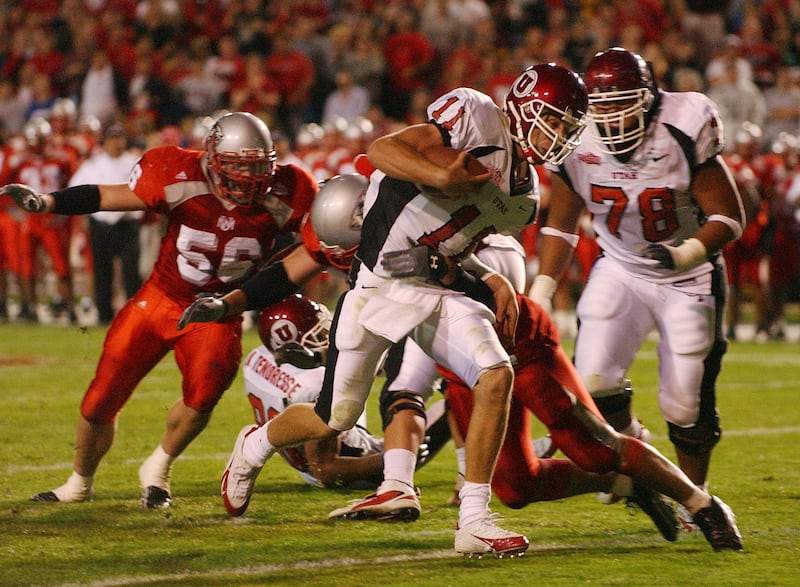Sixteen years after becoming the first overall pick in the 2005 NFL draft, quarterback Alex Smith retired earlier this week.
Smith had a solid, if unspectacular pro career: he was a three-time Pro Bowler, threw for 35,650 yards and 199 touchdowns, and had a 99-67-1 record.
What he did at the University of Utah, however, helped revolutionize the game, Yahoo Sports’ Pete Thamel explained in examining his college career alongside then-Utes coach Urban Meyer.
“Alex put us on the map,” Utah coach Kyle Whittingham told Thamel.
Smith was the captain of a spread offense that’s helped revolutionize the game, Thamel said, and the other key player in that spread offense attack was Dan Mullen, Meyer’s QB coach at Utah in 2003 and 2004 who is now the head coach at Florida.
“What Meyer and Mullen did so effectively was add zone reads, shovel passes and made the quarterback run game a defiant part of an offense that could also be pass happy,” Thamel wrote.
In his first three games as starter at Utah in 2003 after taking over for an injured Brett Elliott, Smith beat Cal’s Aaron Rodgers — the pair’s pro careers would be tied in history after they were the two highest QB prospects in the 2005 draft, when Smith went No. 1 overall and Rodgers No. 24 — and Oregon’s Kellen Clemens.
A 12-2 campaign in 2003 set up bigger things in 2004, when Smith, Meyer and Mullen were the masterminds behind an explosive offense that championed a 13-0 season. The Utes became the first BCS busters that year, dismantling Pittsburgh 35-7 in the Fiesta Bowl to cap that year
“I think that 2004 Utah team changed college football,” Mullen told Thamel. “Alex was a major part of that.”
That year, Utah beat three power conference programs — Texas A&M, Arizona and North Carolina, all by 17 points or more — during the regular season, before the blowout win over the Panthers in the bowl game. The Utes averaged 45.3 points per game, and beat every Mountain West Conference opponent by two touchdowns or more — only two came within 20 points.
Utah’s success captured the attention of pro coaches. Thamel explained that after Meyer took over as Florida’s head coach in 2004, New England Patriots head coach Bill Belichick and quarterbacks coach Josh McDaniels were in his office months later, and they utilized several no-back concepts they gleaned from those visits in the Patriots’ offense.
“The spread offense has kept spreading, too, where it’s now become football convention,” Thamel wrote. “Mullen credits Smith for ushering spread quarterbacks into the NFL, as he said 20 years ago a pocket passer like current Florida draft prospect Kyle Trask would have been the No. 1 pick. Now there’s a premium on mobility, and Trask is stigmatized for not being mobile enough.”
“Back then it was taboo,” Mullen told Thamel of mobile quarterbacks. “Now it’s all anyone wants.”


